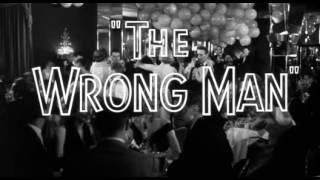
The Wrong Man 1956 -- OPENING TITLE SEQUENCE
Комментарии:

This intro where Alfred gives a speech is impressive.
Ответить
Cool! 🖤🤍👍
Ответить
The Stork was having major union problems at the time this movie was filmed there. only club in NYC not unionized. This was filmed on a Sunday evening which was balloon night .
Ответить
I didn’t understand the storyline of the wife
Ответить
Hitchcock's favorite composer along with Robert Burks was his favorite cinematographer.This is one of the finest work of composer Bernard Hermann.Great heartwarming n touching.💐💐💐
Ответить
Is It True This Was The Only Feature Film In Alfred Hitchcock Spoke In As Prologue Introducing A Different One Based On A True Story? Will You Tube Show The Stork Club Scene Where Alfred Hitchcocks Cameo Was Edited? I Await Your Answer. Did Alfred Hitchcock Also Hire Real Life Extras In The Stork Club Scenes?
Ответить
Hermann's Stork Club Mambo prelude is HEAVENLY. Hitchcock slowly empties the club in subtle fade ins and fade outs till the film itself begins... at closing time. I've seen this movie WAY too many times, I have even watched it twice in the same week! I know all the extras! Bad sign you are Hitchcock crazy.
Ответить
The person who asked to stop the music is non other than the great Bernard Hermann himself who composed this classic movie based on true story starring Henry Fonda,Vera Miles n Anthony Qyale.👍👍👍👌
Ответить
When the police move in to arrest Christopher Emmanuel Balestrero (Henry Fonda), they call out "Chris!" to get his attention, not knowing that his friends call him "Manny." Under arrest, Manny puts his hand in his overcoat pocket. The police, thinking he might be concealing a gun or a knife, grab his hand. He is not holding a weapon but a rosary. Held in a jail in Queens, Manny approaches the cell door and gazes out. It is not the handsome face of a movie star, but a face of fear and despair with a day-old beard. His only solace is his rosary, which the officials have let him keep.
His wife Rose (Vera Miles) suffers a nervous breakdown and admits herself to hospital, feeling she has failed her family.
Manny is exonerated and hurries to the hospital to tell her their troubles are over; but she only grouses, "That's fine for you."
Manny persists, "We can go somewhere else. We can start over."
"It doesn't matter where I am," she replies, "or where anybody is. You can go now," and tunes him out.
The performances are not just good and affecting. They touch us where we live, in experiences that cast us among hostile strangers who don't even know our names and rob us of our dignity and sense of self.
It is this gift of actors that makes us tolerate them when they fall off the wagon or dance nude on tables.


























